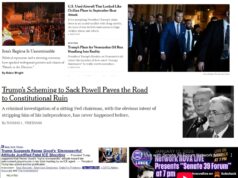This piece has appeared this week in newspapers in my very red congressional district (VA-06).
*******************************
I agree with a lot of people on the right about the great importance of “freedom of religion.” But some seems to have a rather confused notion of what “freedom of religion” means.
Our founders wanted all Americans to be able to believe as their conscience dictated, and to live according to their beliefs. What that meant was that they did not want the coercive power of the state to interfere with the right of every individual to hold the beliefs their conscience dictates and to live their lives accordingly.
To prevent such coercive use of the state, they added a clause that, for more than two generations, has been interpreted by the Supreme Court to mean that the government should remain neutral on religious questions, not favoring one religion over another, nor the religious view over the non-religious.
“Freedom of religion,” in other words, means that no Americans will be able to use the power of the government to enforce or push their religious views onto other Americans.
But that very thing – the use of the government to favor their religious views – seems to be what some think their own “freedom of religion” requires.
They declare, for example, that freedom of religion is being impaired if the religion of the Bible is not promoted in our public schools. But the public schools are part of our political order, and for that reasons — the Courts have said – such government-run schools should steer clear of religious matters.
Would those people want the schools to read the Quran aloud to the students, or the Bhagavad Gita? Or is it only to the Bible — that they, as Christians, favor — that the public schools should expose everyone’s children?
I’ve been puzzled to hear people complain that their religious freedom has been infringed by a prohibition on their praying in public. But no American citizen is forbidden to pray in public places, just as no student in our public schools is forbidden to pray. It is only the government and its agents, with the coercive power they represent, that are supposed to refrain from using their positions of public power to advance any religious view over another.
Between assuring our citizens have full “freedom of religion” and having some of our citizens impose their religious positions on other Americans, isn’t the difference crystal clear?
Another complaint involves the idea that some laws that have been instituted in America go against “God’s laws.” One example of that is the granting to gay people of the legal rights enjoyed by other Americans. We should recall, in that context, that earlier generations, similarly, thought it was contrary to the will of God for black people to be granted rights equal to those enjoyed by whites.
In both those instances, the Court ultimately decided that the whole American ideal of government – that all people are created equal – required that no groups of people be treated as second class citizens.
Does that legal equality of rights interfere with anyone’s “freedom of religion.” Every American – Christian and otherwise — is free to make their own judgments – Bible-based or otherwise– and to live their own lives in accordance with their beliefs.
But it is hardly an infringement on anyone’s religious freedom that no one is free to make what they believe to be God’s laws binding on everyone else.
It is inevitable that our government will violate – or refuse to enforce — the religious convictions of some of its citizens.
Those who are pacifists on religious grounds, for example, still have to pay taxes to support the U.S. military.
And until a half century ago, there were places in America where – because of the religious beliefs of some — it was illegal for married couples to buy contraceptives. That ban on contraceptives – by which some imposed their religious views on everyone else — was rightly overturned.
The great thing about America is that those who think contraception is wrong are free to live according to their religious beliefs. AND, those who do not share that religious belief are free to live according to their own sense of what is right and sacred.
That is true “freedom of religion.”
I would be heartened if people who complain that America’s laws should conform to their understanding of God’s laws would embrace the vision of our founders, who understood that, without “a wall of separation between Church and State” (Jefferson’s phrase), a society would invite the kind of religious wars that had been such a nightmare in Europe.
They should also note that the evidence suggests that the kind of joining of the political and religious domains that the letter espouses has elsewhere proved harmful to both domains.
It is widely – and I think rightly – said that the reason that religion is thriving so much more among the American people than among the Europeans is precisely because America’s “separation of Church and State” has protected the religious world from being dragged down into the struggle for power.
And meanwhile, that same separation has allowed the American government to retain the allegiance of Americans of diverse religious and other worldviews.




![Sunday News: “Trump Is Briefed on Options for Striking Iran as Protests Continue”; “Trump and Vance Are Fanning the Flames. Again”; “Shooting death of [Renee Good] matters to all of us”; “Fascism or freedom? The choice is yours”](https://bluevirginia.us/wp-content/uploads/2026/01/montage011126-238x178.jpg)






